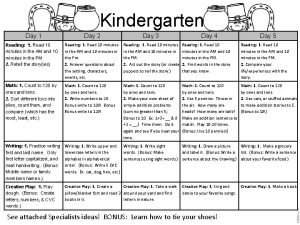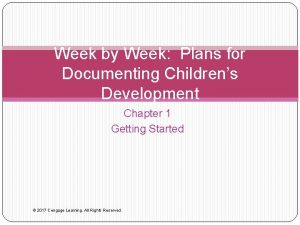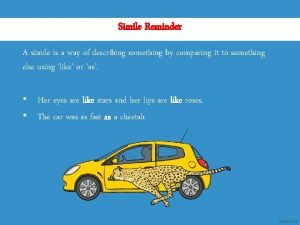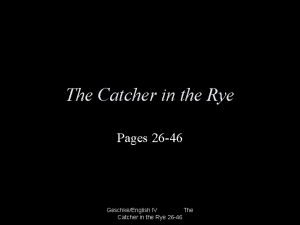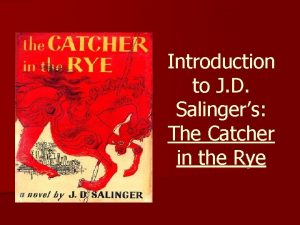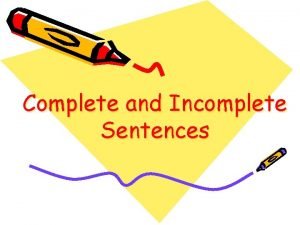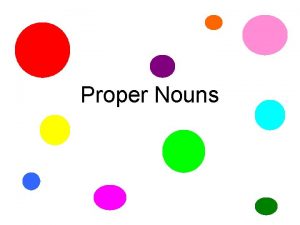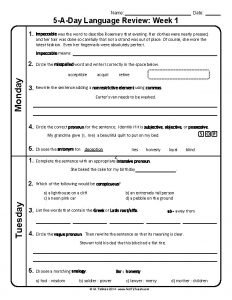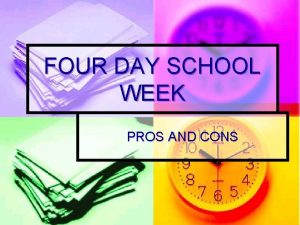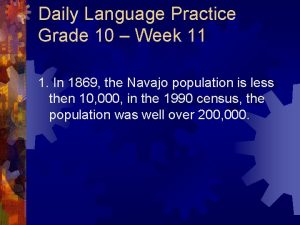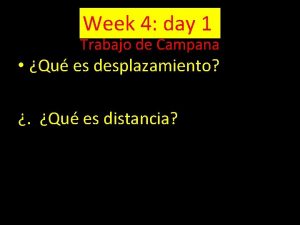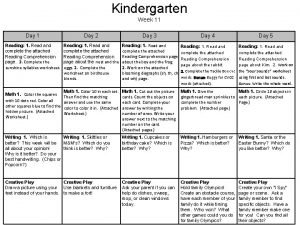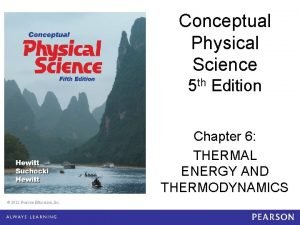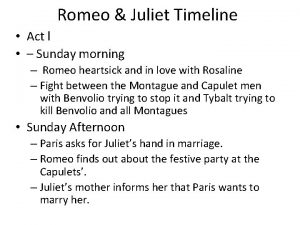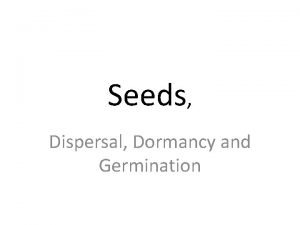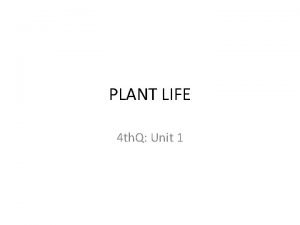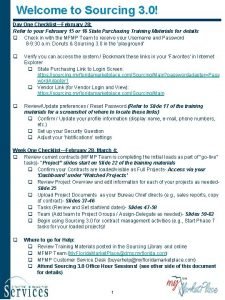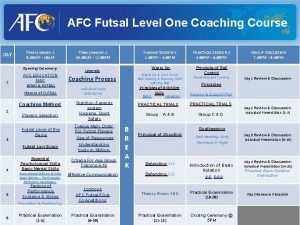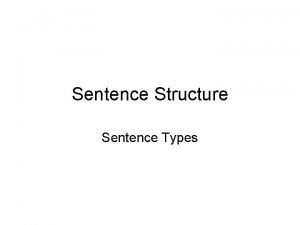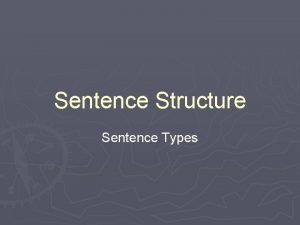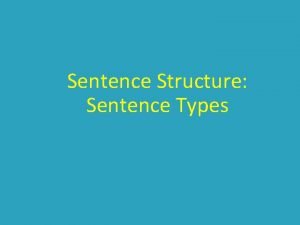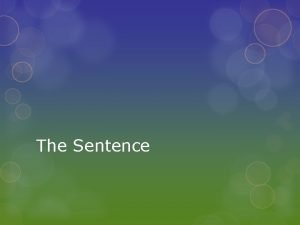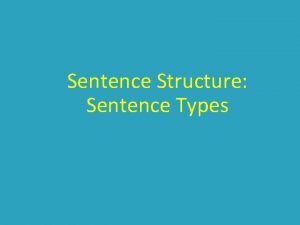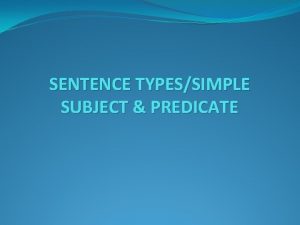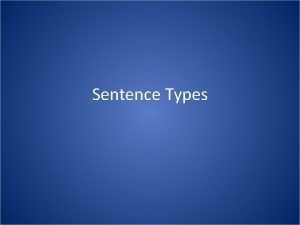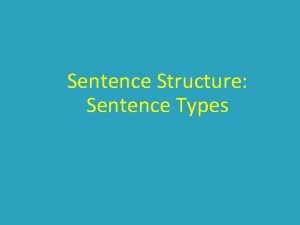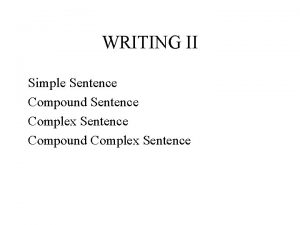Sentence of the Week Kelly Gallagher Procedure Day









































































- Slides: 73

Sentence of the Week Kelly Gallagher

Procedure Day 1: - Teacher provides three sentences that all contain the same editing feature. - Students copy all three sentences. - Below the sentences, students write “What do I notice? ” - Students then make notes of the similarities between the three sentences. - Teacher reviews what students have written and affirms or corrects. - Students imitate this type of editing feature by writing three sentences on their own/in groups. - Teacher check students at random.

Procedure Day 2 (Block): - Teacher provides warm up with additional sentences that use the same editing feature. - Students copy sentences. - Students imitate this type of editing feature by writing three sentences on their own/in groups. - Teacher check students at random.

Procedure Day 3 (Block): - Teacher assesses students based on the sentence of the week (spiraling to past So. Ws as the year goes on). - Assessment can look like a quiz (students can write their own sentence, write a paragraph using the sentence, or the teacher can dictate a sentence and the student must write it using the skill correctly), ticket out the door, or another method the teacher chooses.

Subject Verb Sentences

Identifying a subject and a verb • Jerry ate the pizza. • Mike and Lisa are happy. • Miguel was running in the race. • What do you notice? • Imitate.

Day 2 Identifying a subject and a verb • Michelle ate the ice cream. • Tom and Fernando are unhappy. • Marie was doing her homework. • What do you notice? • Imitate.

Simple Sentences

Writing a simple sentence • The clouds hung in the sky. • Bob sneezed. • The rain pelted the park. • What do you notice? • Imitate.

Day 2 Writing a simple sentence • The sun was bright in the sky. • Panfila coughed. • The student passed the test. • What do you notice? • Imitate.

Coordinating Conjunctions

Coordinating Conjunctions (FANBOYS) • I am late, but I still want to play. • Sam at the entire sandwich, and I watched him do it. • You were rude, so they will not speak to you. • What do you notice? • Imitate.

Day 2 Coordinating Conjunctions (FANBOYS) • I took a taxi, and she drove home. • He didn’t want help, nor did he ask for it. • I wanted to go late, but she wanted to go on time. • What do you notice? • Imitate.

AAAWWUBBIS front-branch sentencing (As, After, Although, When, While, Until, Before, Because, If, Since) (subordinating conjunctions)

AAAWWUBBIS front-branch sentencing (As, After, Although, When, While, Until, Before, Because, If, Since) (subordinating conjunctions) • After the game, I went home. • Even though Paola was short, she was on the volleyball team. • Although it’s cold, Vanessa did not wear a jacket. • What do you notice? • Imitate.

Day 2 AAAWWUBBIS front-branch sentencing (As, After, Although, When, While, Until, Before, Because, If, Since) (subordinating conjunctions) • Although I studied for the test, I did not do well. • If you plan on trying out for a sport, be sure to practice. • Since my brother is younger, he often looks up to me for guidance. • What do you notice? • Imitate.

subordinating conjunctions • Non-AAAWWUBBIS front-branch sentencing

Non-AAAWWUBBIS front-branch sentencing (subordinating conjunctions) • Tired, we collapsed as soon as we arrived home. • Laughing hard, tears ran down our faces. • Without giving it a second thought, we helped the victims. • What do you notice? • Imitate.

Day 2 Non-AAAWWUBBIS front-branch sentencing (subordinating conjunctions) • In the middle of our discussion, Michelle went into labor. • Annoyed by the sound of her voice, I refused to listen to anything she said. • Due to the fact that summer started a week earlier this year, we had to reschedule our summer vacation. • What do you notice? • Imitate.

Appositive Sentences Middle-branch sentencing

Appositive Middle-branch sentencing • John, fourteen, is too young to drive. • My girlfriend, who is afraid of snakes, refused to go. • The player, exhausted from the long game, collapsed. • What do you notice? • Imitate.

Day 2 Middle-branch sentencing • Jae, eager to have a baby, decided to marry the first person she dated. • My boyfriend, who is great at football, received a full scholarship to UCLA. • Juan, who attended UC Davis, became a successful administrator at Whittier High School. • What do you notice? • Imitate.

Semicolon Usage ;

Semicolon usage • The dinner was great; the dessert was average. • The movie was interesting; however, I fell asleep before it ended. • English is my favorite class; Math is a close second. • What do you notice? • Imitate.

Day 2 Semicolon usage • When I finish here, I will be glad to help you; and that is a promise I will keep. • If she can, she will attempt that feat; and if her husband is able, he will be there to see her. • My favorite food is Italian; however, I also like Mediterranean food. • What do you notice? • Imitate.

Quotation with End Attribution

Quotation with end attribution • “I have arrived, ” said Jack. • “That hurts!” screamed Mary. • “Are you sure? ” asked Joe. • What do you notice? • Imitate.

Day 2 Quotation with end attribution • “I like fast cars, ” said Lance. • “I got an A!” screamed Annettee. • “Would you like to go to the movies? ” asked Cole. • What do you notice? • Imitate.

Quotation with Front Attribution

Quotation with front attribution • Jack said, “ I have arrived. ” • Mary screamed, “That hurts!” • Joe asked, “Are you sure? ” • What do you notice? • Imitate.

Day 2 Quotation with front attribution • Jae said, “Here’s my phone number. ” • Gina screamed, “There’s a spider!” • Alexa asked, “Do you like him? ” • What do you notice? • Imitate.

Quotation with middle attribution

Quotation with middle attribution • “I was thinking, ” Lisa said, “that this might not be a good time. ” • “If you don’t leave, ” she screamed, “you will be sorry. ” • “Do you think, ” Mary asked, “that the Angels will win? ” • What do you notice? • Imitate.

Day 2 Quotation with middle attribution • “I was thinking, ” Jim said, “that it might be fun to hunt deer. ” • “If you don’t stop talking to my boyfriend, ” she screamed, “you will be sorry. ” • “Do you think, ” Mary asked, “that the Dodgers will win? ” • What do you notice? • Imitate.

Indirect Quotations

Indirect quotations • Todd said that he was hungry. • Lisa said her injury hurt. • She asked me if I felt well. • What do you notice? • Imitate.

Day 2 Indirect quotations • Carlye said that she wanted a raise. • Stephanie said she wanted a pedicure. • He asked me if I wanted to go to the movies. • What do you notice? • Imitate.

Apostrophes to show possession

Apostrophes to show possession • That is Mike’s car. • That is Ross’s car. • Cesar’s and Larry’s girlfriends will both be there. • What do you notice? • Imitate.

Day 2 Apostrophes to show possession • That is Lance’s car. • That is James’s phone. • Sandra’s and Vicky’s boyfriends do not get along well. • What do you notice? • Imitate.

Apostrophe to show contractions

Apostrophes to show contraction • It’s not funny. • It’s been fun. • You’re right about him. • What do you notice? • Imitate.

Day 2 Apostrophes to show contraction • It’s going to be a great week! • Don’t make me mad. • You’re going to get an A if you study for your quiz. • What do you notice? • Imitate.

Capitalization Rules

Capitalization rules • He drove his Nissan south to get to the South. • The president will address Congress. • My Uncle Dave, a senior citizen who studies biology, is older than my mom. • What do you notice? • Imitate.

Day 2 Capitalization rules • My friend, Michelle, loves her Pomeranians, Buddy and Pommer. • The man drove his Ford truck to Yellowstone National Park. • My Aunt Cindy, an ultramarathon runner, is older than my mom. • What do you notice? • Imitate.

Pronoun-antecedent agreement

Pronoun-antecedent agreement • During the game, a player may forget his plays. • If a person wants to succeed in life, he or she has to work hard. • If people want to succeed in life, they have to work hard. • What do you notice? • Imitate.

Day 2 Pronoun-antecedent agreement • The Girl Scout sold her year’s supply of Girl Scout cookies. • Bob took his dog to the park in order to find its toy. • Jae took her baby to the mall to buy clothes. • What do you notice? • Imitate.

Active Voice

Active Voice • The pizza was eaten by John. / John ate the pizza. • The game was won by Bob. / Bob won the game. • The quiz was taken by the students. / The students took the quiz. • What do you notice? • Imitate.

Day 2 Active Voice • The essay was graded by the teacher. / The teacher graded the essay. • The game was won by the Dodgers. / The Dodgers won the game. • The letter was mailed by Alyssa. / Alyssa mailed the letter. • What do you notice? • Imitate.

Using items in a series

Using items in a series • She went to the store and bought milk, bread, and cereal. • He ran to the field, jumped over the fence, and sprinted to the parking lot. • She was a teacher who arrived early, who worked hard, and who ran a tight ship. • What do you notice? • Imitate.

Day 2 Using items in a series • She went to the Apple store and bought an i. Pod, an i. Phone, and a laptop. • He ran to the park, jumped over the fence, and sprinted to the playground equipment. • She was a player who arrived early, practiced hard, and always won the game. • What do you notice? • Imitate.

Homophones: Your/You’re, its/it’s, there/their/they’re

Your/You’re, its/it’s, there/their/they’re • You’re on the right path to achieve your goal. • It’s funny to watch the dog chase its tail. • They’re not happy that their ball landed there. • What do you notice? • Imitate.

Day 2 Your/You’re, its/it’s, there/their/they’re • Their backpacks are over there by the desks. • It’s sad that the duck lost its mother. • You’re going to be sorry if you don’t study your notes for the quiz. • What do you notice? • Imitate.

Colons

Colons • The plumber brought the following: a wrench, a socket, and a hammer. • I have three brothers: Mike, John, and James. • There was only one possible explanation: they got lost. • What do you notice? • Imitate.

Day 2 Colons • Michelle has three favorite artists: Matisse, Caravaggio, and Kahlo. • I have three sisters: Maxine, Alexa, and Alyssa. • There is only one possible explanation for failing the test: you didn’t study. • What do you notice? • Imitate.

Number Usage

Number usage • I am going to buy twenty-five cups. • I am going to buy 125 cups. • The school has ninety-six boys and 112 girls. • What do you notice? • Imitate.

Day 2 Number usage • My niece is nine years old. • My father is 62. • We ate a million potato chips. • What do you notice? • Imitate.

Hyphens

Hyphens • He loved chocolate-covered peanuts. • She is a well-known student. • Her ex-husband was thirty-seven years old. • What do you notice? • Imitate.

Day 2 Hyphens • This is a low-budget job. • It is a well-paying job. • The five-year-old boy was scared. • What do you notice? • Imitate.

Italics

Italics • I read a review of To Kill a Mockingbird in the Los Angeles Times. • I like Gary Soto’s poem, “Baseball in April, ” which is found in Living Up the Street. • You should not do that! • What do you notice? • Imitate.

Day 2 Italics • My favorite magazine is Newsweek. • Maxine’s favorite television show is The Bachelorette. • I would never date him! • What do you notice? • Imitate.

In-text citations

In-text citations • Johnson, in The Last Chance, said, “This is true” (12). • According to the book, thirty-three people died that day (Anderson 112). • The New Yorker claimed that the politician was a democrat (Stein 2). • What do you notice? • Imitate.

Day 2 In-text citations • Ellis, in her book, Best Teacher, said, “I am the best teacher” (124). • According to the newspaper article, 100 people died in the storm (Cooper 11). • In the short story, “The Possibility of Evil, ” the author tells us of Ms. Strangeworth, “She was fond of doing things exactly right” (Jackson 6). • What do you notice? • Imitate.
 Kelly gallagher article of the week
Kelly gallagher article of the week Article of the week kelly gallagher
Article of the week kelly gallagher Kelly gallagher write like this
Kelly gallagher write like this Deeper reading kelly gallagher
Deeper reading kelly gallagher Day 1 day 2 day 3 day 4
Day 1 day 2 day 3 day 4 Day 1 day 2 day 817
Day 1 day 2 day 817 Week by week plans for documenting children's development
Week by week plans for documenting children's development Mom similes
Mom similes Catcher in the rye page
Catcher in the rye page Connection card office cwu
Connection card office cwu Bobby horan
Bobby horan Kelley gallagher
Kelley gallagher Phoebe caulfield inner desires
Phoebe caulfield inner desires Gallagher law library
Gallagher law library Colm gallagher
Colm gallagher Gallagher hr estimator
Gallagher hr estimator Gallagher
Gallagher Gallagher bassett sa
Gallagher bassett sa Dr.sharongallagher
Dr.sharongallagher K&j tire spring arbor
K&j tire spring arbor Dr christine anne gallagher
Dr christine anne gallagher Closing sentence examples
Closing sentence examples Complete and incomplete sentence examples
Complete and incomplete sentence examples 8 day week
8 day week Book is proper noun
Book is proper noun 5 a day language review week 20
5 a day language review week 20 Four day school week pros and cons
Four day school week pros and cons Monday is my favorite day of the week
Monday is my favorite day of the week Now upon the first day of the week
Now upon the first day of the week Dgp week 11
Dgp week 11 Week 4 day 1
Week 4 day 1 Week 11 day 3
Week 11 day 3 Holy week day 1
Holy week day 1 Family portal schoolmax
Family portal schoolmax Oceans apart day after day meaning
Oceans apart day after day meaning Day to day maintenance
Day to day maintenance As your room gets messier day by day, entropy is
As your room gets messier day by day, entropy is Tomorrow i don't know
Tomorrow i don't know Act 2 timeline romeo and juliet
Act 2 timeline romeo and juliet Growing day by day
Growing day by day Seed germination inhibitors examples
Seed germination inhibitors examples Day by day seed germination observation chart
Day by day seed germination observation chart Observation of plant growth day by day
Observation of plant growth day by day I live for jesus day after day
I live for jesus day after day One day in heaven
One day in heaven Day one day one noodle ss2
Day one day one noodle ss2 Dayone dayone noodles ss2
Dayone dayone noodles ss2 Hình ảnh bộ gõ cơ thể búng tay
Hình ảnh bộ gõ cơ thể búng tay Slidetodoc
Slidetodoc Bổ thể
Bổ thể Tỉ lệ cơ thể trẻ em
Tỉ lệ cơ thể trẻ em Voi kéo gỗ như thế nào
Voi kéo gỗ như thế nào Tư thế worm breton là gì
Tư thế worm breton là gì Alleluia hat len nguoi oi
Alleluia hat len nguoi oi Các môn thể thao bắt đầu bằng tiếng nhảy
Các môn thể thao bắt đầu bằng tiếng nhảy Thế nào là hệ số cao nhất
Thế nào là hệ số cao nhất Các châu lục và đại dương trên thế giới
Các châu lục và đại dương trên thế giới Công thức tiính động năng
Công thức tiính động năng Trời xanh đây là của chúng ta thể thơ
Trời xanh đây là của chúng ta thể thơ Cách giải mật thư tọa độ
Cách giải mật thư tọa độ 101012 bằng
101012 bằng độ dài liên kết
độ dài liên kết Các châu lục và đại dương trên thế giới
Các châu lục và đại dương trên thế giới Thể thơ truyền thống
Thể thơ truyền thống Quá trình desamine hóa có thể tạo ra
Quá trình desamine hóa có thể tạo ra Một số thể thơ truyền thống
Một số thể thơ truyền thống Bàn tay mà dây bẩn
Bàn tay mà dây bẩn Vẽ hình chiếu vuông góc của vật thể sau
Vẽ hình chiếu vuông góc của vật thể sau Thế nào là sự mỏi cơ
Thế nào là sự mỏi cơ đặc điểm cơ thể của người tối cổ
đặc điểm cơ thể của người tối cổ Ví dụ về giọng cùng tên
Ví dụ về giọng cùng tên Vẽ hình chiếu đứng bằng cạnh của vật thể
Vẽ hình chiếu đứng bằng cạnh của vật thể Fecboak
Fecboak Thẻ vin
Thẻ vin




